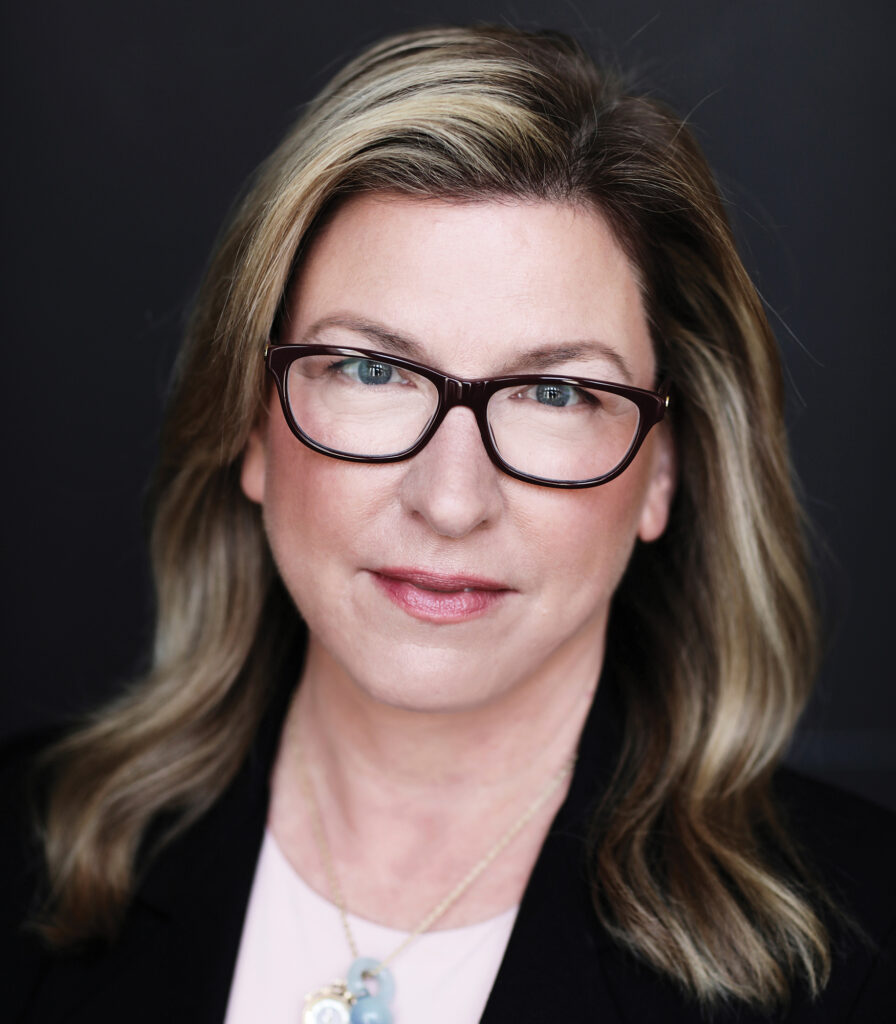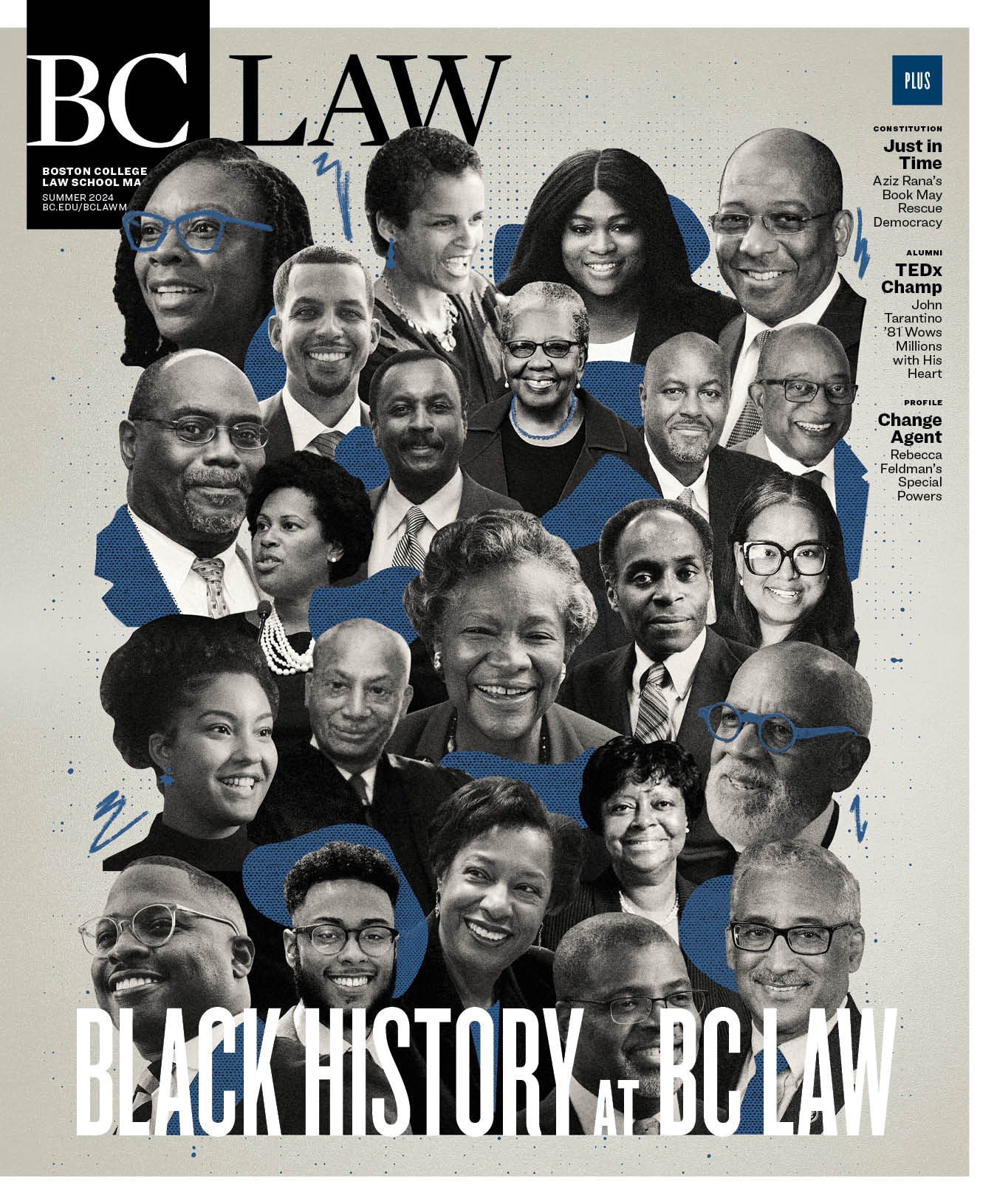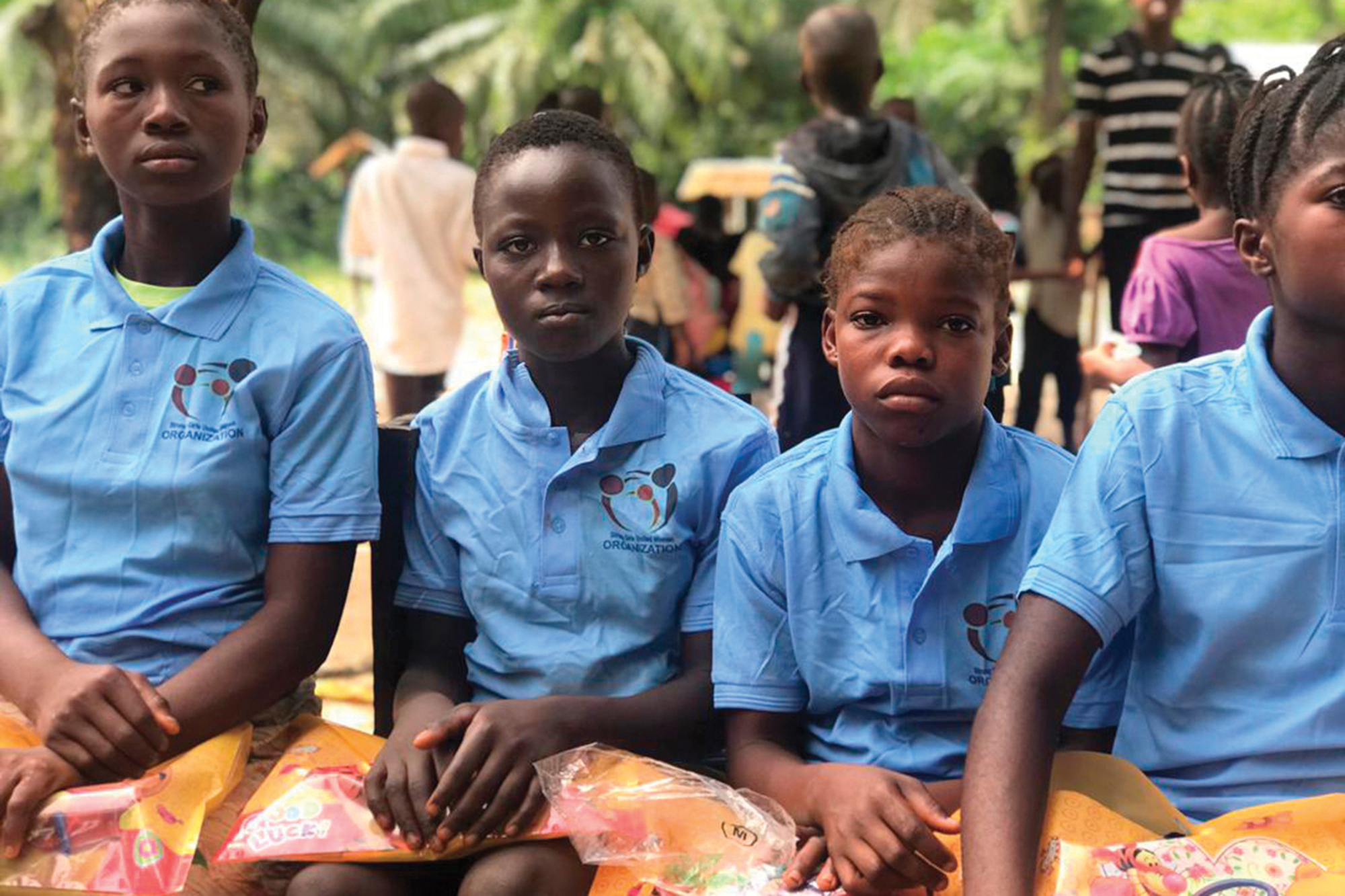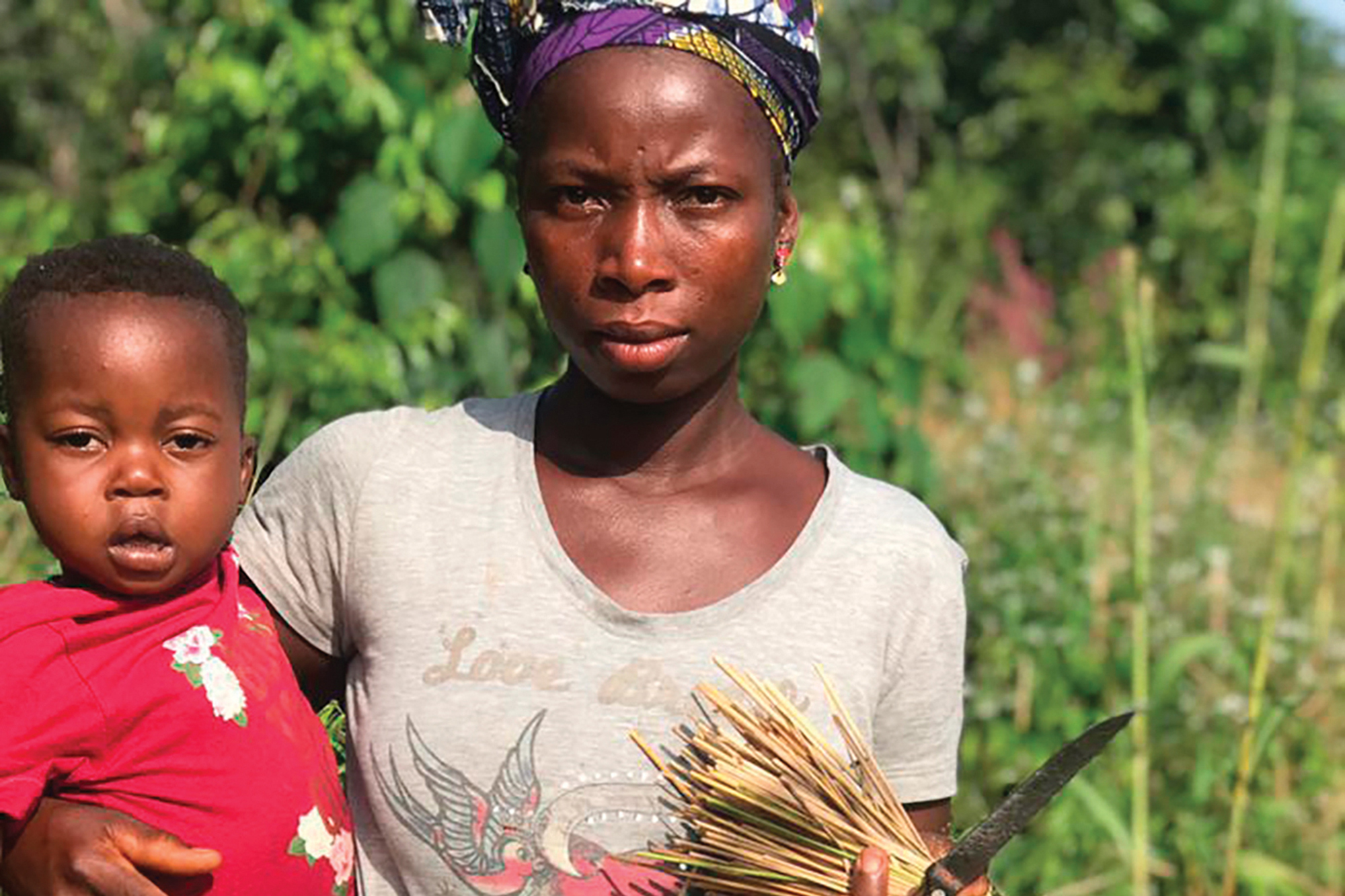When entering Sierra Leone, many might expect to see the dusty scenes often filmed there as a stand-in for the whole African continent. But, most of it is actually forested and green. Or, based on other imagery, many might expect to see women carrying water on their heads with a baby strapped to their backs. But…
How about decorating elaborate wedding cakes?
Nonprofit Strong Girls United Women (SGUW), which teaches girls and women in the country about employment and health education, is all about the unexpected.
That shouldn’t surprise anyone who knows Rebecca (née Rains) Feldman ’97, co-founder and COO of the organization. She’s been doing the unexpected from an early age. Certainly, the principal at a Massachusetts elementary school must have thought so when then-four-year-old Feldman, deciding she was bored being at home, asked to speak with him about starting kindergarten early. Shown her mental mettle when it came to letters and numbers, he relented. “And he paid for it,” she laughs. “I would bring up practically anything I thought was unfair and, as a consequence, I was in poor Mr. Arnold’s office making my case quite often.
“This was part of the milieu I grew up in, it was the 1970s in Cambridge and it seemed like everyone was protesting something and trying to make the world a better place. I was on board for all of it, from the start,” she says.
One of her jobs in high school was working for MASSPIRG (Massachusetts Public Interest Research Group). “They would drop you off in different areas and I would do door-to-door canvassing,” she says. “The PIRGs were working on a bottle bill, consumer issues, and recycling. I learned how campaigning is done, how outreach is done, how education is done, that there are many different components to effecting real change. The PIRGs are very good at it.”
To this day, tackling unfairness is at the heart of Feldman’s work. Strong Girls United Women is the latest example. “Most people in Sierra Leone have tough lives,” she observes. “They go through things many of us can’t fathom. There are a lot of factors contributing to their insecurity; some is due to post-conflict flux, to poverty, and social instability.” In fact, the country is among the poorest in the world, dealing with everything from climate change to sky-high inflation, according to international sources.
And in 2019, the president of the country declared gender-based violence a national emergency. “To this day, we see the prevalence of rape, domestic abuse, and assault against women and girls is astronomically high,” Feldman says.
Strong Girls United Women provides classes in health and safety, with a strong focus on sexual health and safety for young women. Feldman’s sister-in-law, Dorah Rains, is president of the organization and saw the effect of a lack of health safety education growing up in Sierra Leone. “I was born in Sierra Leone and grew up during war,” she says. “There are so many girls who have had their lives affected. I had been thinking about a training program for girls on sexual reproductive issues and pregnancy from a young age. You see some women who would do anything for a man, and they didn’t have the knowledge that might have changed their futures.”
Rains and Feldman live in and direct operations of Strong Girls United Women from Massachusetts. The two other co-founders are based in Sierra Leone and are experienced educators who teach the classes. An agricultural field officer and some part-time people complete the roster.
“Most people in Sierra Leone have tough lives. They go through things many of us can’t fathom. There are a lot of factors contributing to their insecurity; some is due to post-conflict flux, to poverty, and social instability.”
Rebecca Feldman, COO of Strong Girls United Women
Feldman is focused mostly on the organizational and back-office support side. “I got us incorporated, I did the legal work to get us started, I do the financials, I designed the website, I write the blog, contact funders, grants, things along those lines,” she says. “I’m also the one person on our team with decades of nonprofit experience, so I can provide that perspective.” Those skills are complemented with what Rains describes as Feldman’s passion for the work and a good sense of humor: “She keeps people positive with the attitude she brings.”
The team’s impact has been considerable. “So far, we’ve taught over 400 girls through the year-long classes,” Feldman explains. “Our classrooms are designed as a safe place, a place of trust where we can talk about private and stigmatized issues like contraception, sexually transmitted diseases, AIDS, and sexual violence. We use role-plays, songs, and art to lighten the mood and reach the kids where they’re at. I’d say our number one goal is pregnancy prevention and keeping girls in school. That’s our best outcome.”
The SGUW classes are taught in four schools, two in Sierra Leone’s capital, Freetown, and two in the city of Bo, where the girls are gaining a vital boost in self-esteem and learning how to stand up for the life they want. They walk around proudly with shirts that say “Strong Girls,” Feldman notes, and people call out “Strong Girl! Strong Girl!” as they pass by.
After his first year teaching in one of the Freetown schools, that headmaster shared a most telling statistic: zero. “After school ended for summer break, he reached out to tell us that it was the first year that there wasn’t one pregnancy at the school. Not just the girls in the SGUW class—but in the whole school. That let us know we were on the right track,” Feldman says.
Looking to the future also means preparing the girls for employment. Strong Girls United Women trains them in tailoring, tie-dye (a traditional craft in Sierra Leone called gara), and, yes, cake decoration. The women have the talent—and now the know-how—to make a living at it.
The organization also trains and supports women farmers living in rural villages outside of Bo. They work with a women’s farming collective and have planted acres of pineapple, corn, rice, and groundnuts (peanuts). “We started the agricultural program with twenty-five women farmers,” Feldman says, “and today it’s around seventy farmers. And, we just completed our latest ground nut farm in a new village. These programs support women who are often heads of household supporting children. It provides additional food for their families and produce to sell at the market so they can afford to keep their children, including the girls, in school longer. It’s all connected.”
Feldman’s BC Law School education and early career prepared her to be COO of Strong Girls United Women.
“I wasn’t sure exactly how or if I would practice law in a traditional sense…but I wanted international law knowledge and human rights knowledge, and a law school education would give me that. Also, since I was about ten years old people had been asking me, have you considered being a lawyer, seems like a natural fit,” Feldman says.
“I remember in my second year going to Cuba as part of a class taught by the social work department and the Law School. It was enlightening to understand different roles in Cuba, especially for women. What I wanted from law school was exactly the depth of knowledge and training I received at BC Law. I really don’t think I could have asked for a better law school experience.”
Also in that second year, classmate Natasha Fekula observed that in the asylum clinic Feldman seemed to have found her people and place. “I think one of the reasons she is interested in helping people goes back to a desire to right some wrongs,” Fekula says. Indeed, upon graduation, Feldman remained at BC (from 1997 to 1999) as supervising attorney for the Boston College Immigration and Asylum Project, representing asylum seekers.
Professor Daniel Kanstroom, whom Feldman considers a “key mentor,” says that she “played a very important role—along with Sarah Ignatius at that time—in helping to build our (then-nascent) immigration clinical program by handling tough cases and helping to supervise students.”
As a supervising attorney, Feldman says she worked largely with people who had been ordered deported but could not be removed from the US, often because their country wouldn’t receive them. “I visited clients in county jails and state prisons from Texas to Maine,” Feldman recalls, “and it was directly because of that work with prison populations and looking at conditions of detention, that I met Benjamin Ngachoko.” The founder of the International Institute for Justice and Development later hired her to be principle investigator for a field report examining the carceral system in Benin.
“Feldman played a very important role—along with Sarah Ignatius at that time—in helping to build our (then-nascent) immigration clinical program by handling tough cases and helping to supervise students.”
Professor Daniel Kanstroom
Feldman, as usual, bravely placed herself front and center in a place of need. “I visited eight of the eleven prisons in Benin, and you would literally see violence happen right before your eyes,” she recalls. “These were prisons where the guards were on the outside, not the inside. It was humbling. Sometimes the hardest part about helping is realizing the limitations of your help within a larger system.”
In her subsequent job as director of the International Institute of New England from the mid-2000s to 2013, Feldman ran its Lowell and New Hampshire offices and was a part of the institute’s expansion of the refugee resettlement program.
She considered it a privilege to work with refugees and to assist those fleeing hardship and violence. “Many people think of refugees as without hope, but they’re some of the strongest people I’ve ever met. They have decided they just won’t give up; they’re going to get out of an awful situation and find a better life. Most of the time they are doing it for their kids—they want them to be safe, to have a life. It’s not anything less than inspiring,” Feldman says. “You meet a woman from a very different culture, with different expectations, different language and social norms, with a passel of children, and you can’t help but be in awe of her strength to get here and keep her family together. So many people struggle just for the basics in life that most people take for granted.”
Throughout her experiences, two familiar characteristics kept Feldman going, a sense of humor—“it’s a long haul when you do the work I’ve done; if you only think about the awful things you see, it’s hard to last”—and gratitude for the generosity of others.
She recalls, for example, the New Englanders who stepped up to aid her refugee clients. “So many times, I saw the neighbors of our clients, in towns where residents themselves didn’t have much, giving with such heart—food, time, whatever kindness they could. People can relate to a family leaving their home, fleeing war and violence, and having to rebuild. I think we need more reminders of how generous we are as a people; that can help unite us.”
Though many years have passed, Feldman admits during a phone interview that in many ways she is still that exuberant young girl who talked her way into kindergarten. To make her point, she recalls an experience when she was around seven and living in New Mexico. “I wrote the president [Jimmy Carter] when I was a girl in Roswell to tell him about how great my school was, how many different cultures we had there, and that it was a fully integrated school, meaning all children in the same classroom. I went to school with blind kids, disabled kids, all varieties of children, and how we all got along so well,” she says. “I was written back on White House stationery congratulating me on attending a wonderful public school and that I was so positive about it. I was so excited! I don’t know if the president himself read it but I do know how terrific it felt.”
She pauses for a moment.
“I’ve always wanted to share a positive message…I guess even then.”






